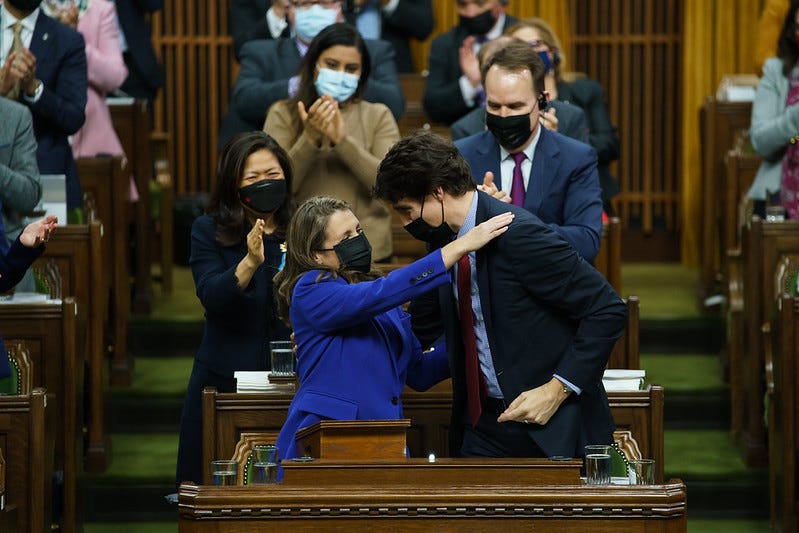The 2023 Federal Budget's Hidden Austerity
With all the talk of new spending and subsidies, it's easy to overlook the budget's warning shot to public sector workers.

Media coverage of budget 2023 has largely focused on a few major spending items and understandably so — that’s what budgets are largely made of. But an excessive focus on new expenditures comes at the expense of its finer details, including a broad-based reduction in the public sector’s size.
This year’s new spending consists primarily of $22 billion for improving health care, $13 billion for expanding a means-tested dental care program, $21 billion in various tax incentives to encourage companies to invest in renewable energy and a $2.5-billion expansion of the GST tax credit that amounts to a one-time $467 payment for families struggling with groceries.
While subsidizing private companies to invest in renewable energy, as the U.S. has done with its Inflation Reduction Act, isn’t ideal, it’s laudable that the government is restricting these subsidies to companies that pay union wages. The budget’s nod to anti-scab legislation is similarly promising, although it’s not coming until the end of the year.
As usual, there was much handwringing about the deficit, ignoring the fact that we could eliminate the $41-billion shortfall tomorrow if we taxed the wealthy appropriately.
There were, of course, new taxes, but none nearly sufficient enough to fund an actual social safety net. These are outlined in Chapter 6 of the budget, “Effective Government and a Fair Tax System.”
They consist of a 2% tax on stock buybacks, an increase to the alternative minimum tax, which is designed to tax high-income earners who have otherwise avoided paying income taxes, to 20.5% from 15%, and a tax on financial institutions’ dividends. All of this adds up to $11.6 billion in new revenue over the next five years, which I suppose is a good start.
The same budget chapter reveals that these new revenue tools are more than offset with $15.4 billion in “targeted reductions” — ‘cuts’ in English — that the government is implementing over the same period.
Much of the media attention on these cuts has focused on a five-year $7-billion, or 15%, reduction in travel expenses and the use of private sector management consultants, followed by a $1.7 billion in annual cuts afterwards — amounting to another $8.5 billion over the next five years. These cuts are no doubt informed by the backlash over $116.8 million the Liberals have contracted out to McKinsey since 2015, more than half of which came over the past two years.
Cutting back on private sector consultants, who are doing the work governments should do anyway, makes sense.
But the government is sending mixed messages with another $7 billion slated to come from a 3% across-the-board cut to the public sector over the next four years, which Finance Minister Chrystia Freeland declared “eminently attainable.”
Afterwards, departments will be expected to find annual savings of $2.4 billion, or another $9.6 billion over the following four years.
Fred O'Riordon, head of tax policy at Ernst & Young — a firm known to be rather amenable to cutting government spending — described across-the-board cuts as a “pretty blunt instrument.”
"It doesn't distinguish between programs that are already running efficiently and effectively and those that aren't, and it doesn't identify programs that are no longer necessary," he told CTV News.
The government is also instructing Crown corporations to make “comparable spending reductions” starting next year, which are expected to net the government $1.3 billion over the next four years and $450 million a year afterwards — or $1.8 billion over the following four years.
So in addition to $15.4 billion in cuts over the next five years, the following five years will consist of an additional $19.9 billion in cuts, totalling $35.3 billion over a decade — and that’s only if there are no more cuts outlined in the next budget.
The 2023 budget says these cuts cannot come at the expense of “direct benefits and service delivery to Canadians; direct transfers to other orders of government and Indigenous communities; and the Canadian Armed Forces [emphases mine].”
Well, then, where are these cuts going to come from?
That’s what Chris Aylward, head of the Public Services Alliance of Canada (PSAC), would like to know. “We're concerned about potential job loss as a result of this budget," Aylward said. "This budget screams austerity."
The use of the word ‘direct’ is an important caveat. Departments, in other words, won’t cut services, but they’ll cut the jobs of those who deliver them, necessitating either a qualitative or quantitative reduction in services from an increasingly overworked civil service.
It’s worth noting that PSAC is in the midst of fraught negotiations with the feds, with a strike vote for 35,000 Canada Revenue Agency workers wrapping up at the end of next week, and another for 120,000 Treasury Board workers set to close April 17. Perhaps that’s why anti-scab legislation isn’t coming until the end of the year.
In this context, these sweeping public sector cuts could be construed as a threat.
Alberta premier boasts frequent contact with prosecutors about COVID restriction-related cases in leaked audio
The CBC obtained an 11-minute recording of Alberta Premier Danielle Smith telling far-right pastor Artur Pawlowski, who faces criminal charges related to the February 2022 Coutts blockade, that her office been in “almost weekly” contact with justice ministry officials about pandemic-related charges.
The recording comes from a phone conversation between Smith and Pawlowski from early-January, weeks before he was set to go on trial for criminal mischief and a Critical Infrastructure Defence Act charge in a Lethbridge courthouse. Smith promised him she would raise his case to justice ministry officials again.
"Can you just leave this with me and I will make that request one more time?"
Smith admitted she “didn't understand the limitations” of her ability as premier to grant amnesty to those facing criminal charges, as she had promised to do while campaigning. "I thought we had the same power of clemency we had in the U.S.,” she said. This is itself an extraordinary admission.
The CBC previously reported that an unidentified Smith staffer sent emails to Crown prosecutors to ask that they drop Coutts blockade-related cases, although the public broadcaster later admitted its reporters hadn’t seen the emails in question. Smith called that story “defamatory” and called for it to be retracted.
In the leaked audio, Smith identified staffer Rob Anderson as her point man speaking to the ministry about the prosecutions.
Calling the CBC’s reporting “absolutely disgusting,” Anderson issued a statement reading, in part, “to my knowledge, I do not recall speaking with anyone charged with ongoing COVID related offenses,” which is a particularly odd way to deny an allegation, even more so when it’s one the story doesn’t make.
Adding to the suspicious behaviour, Smith issued a preemptive news release, which said she already acknowledged contacting Pawlowski at a Feb. 9 press conference, referencing the CBC’s ongoing “campaign of defamatory attacks against me and my office staff.”
The issue the most recent CBC story draws attention to, however, isn’t that she contacted Pawlowski, but that she said she’s been in regular contact with Alberta Justice officials about Coutts-related charges.
Read the full story and listen to the recording here.
In other news …
Canadian International Development Minister Harjit Sajjan was instructed to lobby Qatari officials at the World Cup about potentially purchasing light-armoured vehicles from a Canadian firm, despite Qatar’s well-documented pattern of human rights abuses, The Maple reported.
A group of New Brunswick residents suffering from a mysterious neurological condition and their families have asked the Public Health Agency of Canada to investigate a medical opinion that their ailment resulted from exposure to herbicides.
Toronto cop Anson Alfonso is facing four police misconduct charges for dismissing a domestic violence complaint from 23-year-old Daniella Mallia, who repeatedly told the officer she was in danger three days before she was allegedly murdered by her ex-boyfriend. Alfonso is suspended with pay.
A sexual assault conviction for former Durham Region cop Jack Stelwagen was thrown out due to a delay caused by part-time, semi-retired presiding Judge Bruce Frazer’s decision to take an extended vacation.
U.S. legislatures have brought forward almost 200 pieces of anti-trans legislation this year, most recently in Kentucky. This legislation bans gender-affirming care for minors, allows teachers to deadname and misgender students, prohibits discussions of gender identity and sexual orientation in the classroom, and bars trans students from using the bathroom corresponding to their gender.
The A/V Corner
Watch: The Breach lampoons the federal government’s inaction in the face of growing tar sands tailing ponds — the toxic sludge leftover from oil mining polluting the Athabasca River — with a mock ad.




